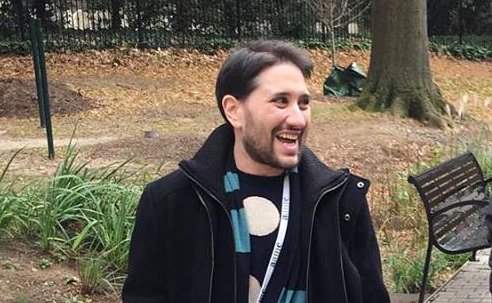The majority of the sustainability-focused projects awarded Georgetown University’s new Laudato Si’ Grant are by faculty and staff, who are now planning and executing their proposals for this academic year.
The Office of Sustainability announced the Laudato Si’ Fund, named after Pope Francis’ 2015 encyclical on environmental justice, in January to encourage collaboration combating sustainability challenges. The 11 grant recipients revealed at the end of May include eight projects by professors and staff in a range of campus programs.
Among the faculty and staff projects receiving grant funds are “Design Transfigured,” an exhibition featuring fashion and furniture made of waste materials; “Disability, Disaster and Climate Change: A Public Ethics Project,” which features a summit on the intersection of disability, environmental ethics and climate change and “Incorporating Sustainability Across the Curriculum,” which will work with faculty to make their courses more environmentally friendly.

The $300,000 in the Laudato Si’ Fund was distributed to the different projects in amounts ranging from $10,000 to $50,000.
“Design Transfigured” will show 40 works of clothing, jewelry and furniture crafted from trash in an effort to convey pollution’s impact. Led by Albey Miner, director of Georgetown University galleries, the exhibition will feature 25 international designers and studios.
It will not only create avenues for conversations around sustainability, but also show that waste can be creatively utilized to make useful products, according to Miner.
“We always intend our exhibitions to spark interesting new dialogues among our campus community,” Miner wrote in an email to The Hoya. “This particular show will hopefully expand individuals’ definition of “upcycling” and challenge them to consider new ways of approaching waste.”
The exhibition will show in the Maria & Alberto de la Cruz Art Gallery and Lucille M. and Richard F.X. Spagnuolo Art Gallery starting Oct. 2 during a public reception and will remain on display until Dec. 15. There will also be a panel on Oct. 3 following the exhibition’s opening featuring a few of the artists, one of the art curators and some Georgetown faculty members, according to Miner.
The “Design Transformed” display is crucial in highlighting the role that artists and designers play in finding a solution to current environmental issues, according to Miner.
“The environmental crisis impacts all of us; we often hear about potential solutions from scientists and politicians, but artists and designers are making fascinating and unique contributions to the conversation and to our lives,” Miner wrote.
Laudato Si’ Grant recipient Julia Watts Belser, an associate professor of Jewish studies, is gathering activists, artists and academics for “Disability, Disaster and Climate Change: A Public Ethics Project.”
The project will include a three-day strategy summit March 28 to 30 featuring around 20 scholars and activists. The summit will discuss topics like how prisons are frequently located in environmentally harmful areas and the structural barriers facing disabled communities that become life-threatening in an emergency, according to Belser.
Bringing together people from a range of disciples will facilitate an exchange of ideas, according to Belser.
“One of my key goals for the project is to bring together a highly interdisciplinary group of scholars, artists, and activists — people who don’t usually have a chance to be in the same room, strategizing together, sharing ideas, and exchanging knowledge,” Belser wrote in an email to The Hoya.
Climate change can lead to conflict, and the impact of both are particularly felt by those with disabilities, Belser wrote. These intersections will be another source of discussion at the summit.
“We’ll also have scholars and activists present who’re thinking about the intersection of disability, war, and climate change,” Belser wrote. “Climate change is a significant driver of conflict, and war is a tremendous cause of both disability and environmental harm — not just in the immediate sense of disability caused by the overt violence of war, but also because chemical residues from weaponry often affects regions for generations.”
“Incorporating Sustainability Across the Curriculum,” led by Senior Associate Director for Assessment and Programs at the Center for New Designs in Learning and Scholarship Mindy McWilliams, will work with about 10 faculty members to develop their courses’ environmental friendliness.
The project provides faculty members an opportunity to discuss how to incorporate sustainability into classes and daily life in a forum that previously did not exist on campus, according to McWilliams.
“There are a lot of courses, minors and majors where students can focus on learning about sustainability and environmental education, but I haven’t really seen at Georgetown anything that brought faculty together to talk about these issues and how they’re trying to make strides in their own courses,” McWilliams said in an interview with The Hoya.
In the spring, McWilliams plans to host a public forum or speaker that will involve more of the university community.
The project’s collaborative and discussion-based model creates an environment in which people can share ideas and be inspired to shift toward more ecologically-conscious lifestyles, McWilliams said.
“To bring people together and share resources and ideas to get inspired together always seems to have a lot more power than doing things in isolation,” McWilliams said.




















